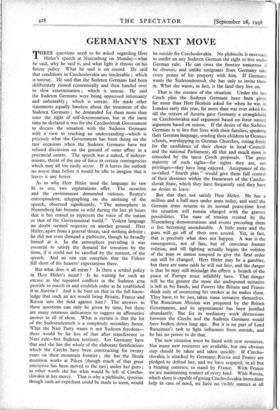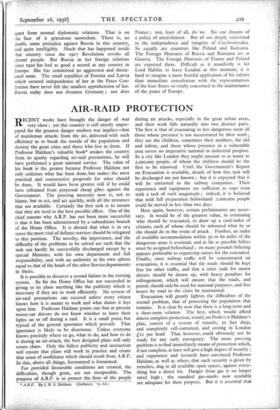GERMANY'S NEXT MOVE T HREE questions need to be asked regarding
Herr Hitler's speech at Nuremberg on Monday—what he said, why he said it, and what light it throws on his future policy. What he said is on record. He said that conditions in Czechoslovakia are intolerable ; which is untrue. He said that the Sudeten Germans had been deliberately ruined economically and then handed over to slow extermination ; which is untrue. He said the Sudeten Germans were being oppressed inhumanly and unbearably ; which is untrue. He made other statements equally baseless about the treatment of the Sudeten Germans ; he demanded for them more than once the right of self-determination, but at the same time he declared it was for the Czechoslovak Government to discuss the situation with the Sudeten Germans with a view to reaching an understanding—which is precisely what the Government has been doing on the rare occasions when the Sudeten Germans have not refused discussion on the ground of some affray in a provincial centre. The speech was A naked, if indeter- minate, threat of the use of force in certain contingencies which may all, too easily occur. If it leaves the outlook no worse than before it would be idle to imagine that it leaves it any better.
• As to why Herr Hitler used the language he saw fit to use, two explanations offer. The occasion and the environment demanded violence. Reuter's correspondent, telegraphing on the morning of the speech, observed significantly, "The atmosphere in Nuremberg has become so wild during the last 36 hours that it has ceased to represent the voice of the nation • or that of the Governmental world." Violent language no doubt seemed requisite on another ground. Herr Hitler, apart from a general threat, said nothing definite ; he did not even demand a plebiscite, though he broadly hinted at it. In the atmosphere prevailing it was essential to satisfy the demand for sensation by the form, if it could not be satisfied by the content, of the speech. And no one can complain that the Fiihrer fell short of his hearers' expectations there.
But what does it all mean ? Is there a settled policy in Herr Hitler's mind ? Is he waiting for such an excuse as the repeated conflicts in the Sudeten area provide to march in and establish order as he established it in Austria ? And is he bent on that in the full know- ledge that such an act would bring Britain, France and Russia into the field against him ? The answers to those questions can only be given by time, but there are many ominous indications to suggest an affirmative answer to all of them. What is certain is that the lot of the Sudetendeutsch is a completely secondary factor. What the Nazi Party wants is not Sudeten freedom— there would be far less of that after transference to Nazi rule—but Sudeten territory. Let Germany have that and she has the whole of the elaborate. fortifications which the Czechs have been constructing for twenty years on their mountain frontier ; she has the Skoda munition works at Pilsen (though much of that great enterprise has been moved to the east) under her guns ; in other words she has what would be left of Czecho- slovakia at her mercy. That is why a plebiscite, specious though such an expedient could be made to seem, would be suicide for Czechoslovakia. No plebiscite is necessary to confer on any Sudeten German the right to live under German rule. He can cross the frontier tomorrow if he chooses, and unlike emigrants from Germany take every penny of his property with him. -If Germany wants the Sudetendeutsch she has only to invite them in. What she wants, in fact, is the land they live on.
That is the essence of the situation. Under the last Czech plan the Sudeten Germans have been given far more than Herr Henlein asked for when he was in London early this year, far more than was ever asked for till the seizure of Austria gave Germany a stranglehold on Czechoslovakia and argument based on force" ousted argument based on reason. If the desire of the Sudeten Germans is to live free lives with their families, -speaking their German language, sending theirchildren to German schools, worshipping in German Churches, voting freely for the candidates of their choice in local Councils and the national Parliament, all that and much more is conceded by the latest Czech proposals. The great majority of such rights—for rights they are, not privileges—they have long enjoyed. Acceptance of the so-called "fourth plan" would give them full control of their destinies within the framework of the Czecho- slovak State, which they have frequently said they have no, desire to leave.
But that does not satisfy Herr Hitler. He has a million and a half men under arms today, and until the German army returns to its normal peace-time level the situation will remain charged with the gravest possibilities. The state of tension created by .the Nuremberg demonstrations and events preceding them is fast becoming unendurable. A little more and the guns will go off of their own accord. Yet, in fact, that is precisely what does not happen. A war is the consequence, not of fate, but of• conscious human volition, and till fighting actually begins the volition of the man or nation tempted to give the fatal order can still. be changed. Herr Hitler may be a gambler, but there are some odds he will not face, and the danger is that he may still misjudge the effects a breach of the peace of Europe must infallibly have. That danger will be the greater the more the undisputed initiative is left in his hands, and Powers like Britain and France think only of countering his strokes as he makes them. They have, to be just, taken some initiative themselves. The Runciman Mission was proposed by the British Government, and its appointment has been justified abundantly But for its mediatory work discussions between the Czechs and the Sudeten Germans would have broken down long ago. But it is no part of Lord Runciman's task to fight influences from outside, and he has no power to do that.
The 'new situation must be faced with new resources. Not many new resources are available, but one obvious step should be taken and taken quickly. If Czecho- slovakia _is attacked -by Germany, Russia and France are pledged to defend- her, and we have engaged, in all but a binding contract; to stand by France. With France we are maintaining contact of every kind. With Russia, which alone is capable of giving Czechoslovakia immediate help in case of need, we haVe "no Visible contact it all apart from normal diplomatic relations. That is on the face of it gratuitous =wisdom. There is, no doubt, some prejudice against Russia in this country, and quite intelligibly. Much that has happened inside that country since the 1917 Revolution revolts all decent people. But Russia in her foreign relations since 1920 has had as good a record as any country in Europe. She has committed no aggression and threat- ened none. The small republics of Estonia and Latvia which secured independence of her at the Peace Con- ference have never felt the smallest apprehension of her. Russia today does not threaten Germany ; nor does France ; nor, least of all, do we. No one dreams of a policy of encirclement. But all are deeply concerned in the independence and integrity of Czechoslovakia. So equally are countries like Poland and Rumania. The Foreign Ministers of Russia and Rumania are at Geneva. The Foreign Ministers of France and Poland are expected there. Difficult as it manifestly is for Lord Halifax to leave London at this moment, it is hard to imagine a more fruitful application of his talents than immediate consultation with the representatives of the four States so vitally concerned in the maintenance of the peace of Europe.











































 Previous page
Previous page